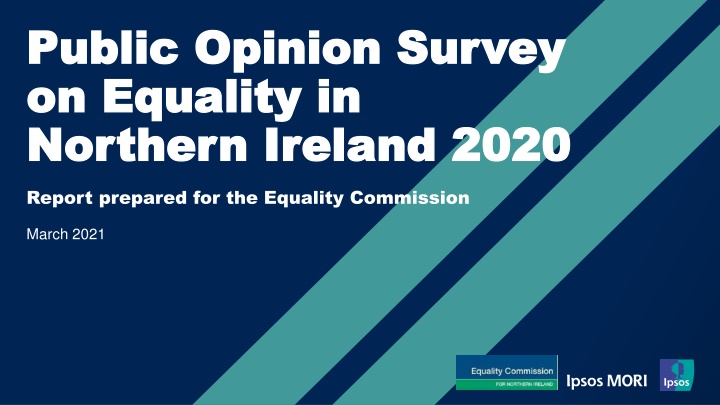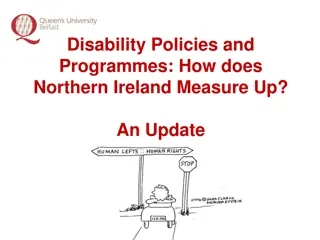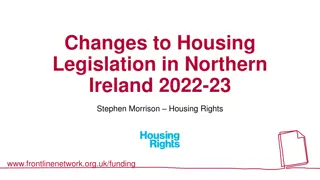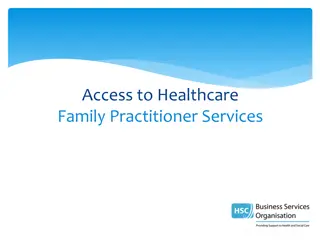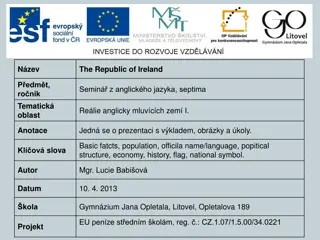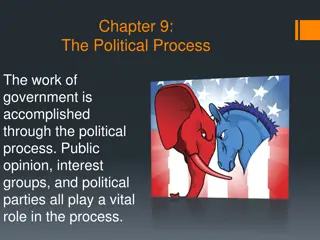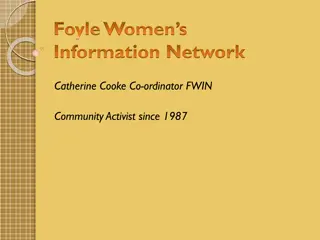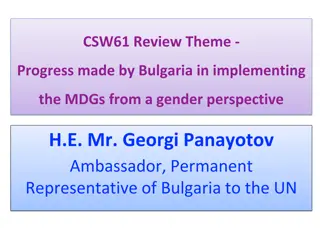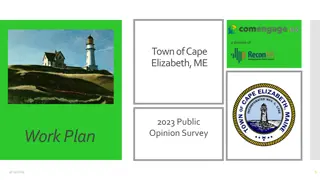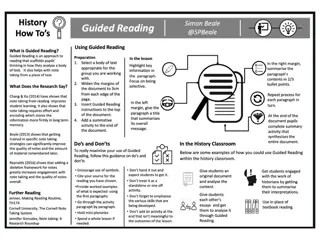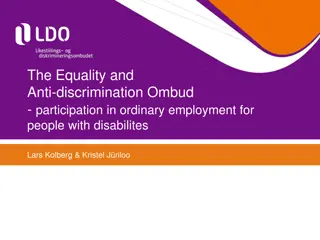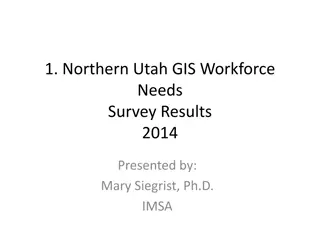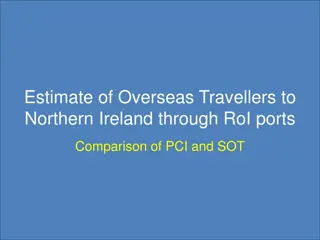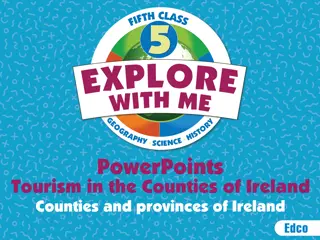Public Opinion Survey on Equality in Northern Ireland 2020 Report Summary
The report on public opinion regarding equality in Northern Ireland in 2020 highlights various aspects including awareness, understanding, personal experiences, attitudes, and views on equality and access to services. Key findings show a decrease in awareness, concerns about discrimination laws, support for employees with disabilities, and perceptions of inclusivity in workplaces. Challenges in accessing services for people with disabilities were also noted. Overall, the report provides insights into public perceptions and attitudes towards equality and inclusivity in Northern Ireland.
Download Presentation

Please find below an Image/Link to download the presentation.
The content on the website is provided AS IS for your information and personal use only. It may not be sold, licensed, or shared on other websites without obtaining consent from the author.If you encounter any issues during the download, it is possible that the publisher has removed the file from their server.
You are allowed to download the files provided on this website for personal or commercial use, subject to the condition that they are used lawfully. All files are the property of their respective owners.
The content on the website is provided AS IS for your information and personal use only. It may not be sold, licensed, or shared on other websites without obtaining consent from the author.
E N D
Presentation Transcript
Public Opinion Survey Public Opinion Survey on Equality in on Equality in Northern Ireland 2020 Northern Ireland 2020 Report prepared for the Equality Commission March 2021
Contents 3 2 1 Background to the research Demographics overview Executive summary 4 5 Research findings Methodology 2 2
1. Executive Executive summary summary 3 3
Executive summary (1) Equality: awareness, understanding and experiences meaningless to them and not something they think about day to day (29%), marking a significant decrease on the previous year (36%). Just over a quarter of participants who are in work report witnessing a situation where others in the workplace were not treated with dignity and respect based on their personal characteristics (27%). Awareness and understanding When asked what the term equality means to participants, thinking specifically about Northern Ireland (NI), the most commonly cited response is that it means religious equality (17%). Over one in ten (15%) hold a negative view of equality or feel that equality in NI is lacking. Personal experiences Of those in work, the majority report that they have not personally experienced a situation where they were not treated with dignity and respect in the workplace based on personal characteristics (82%). Almost one-fifth (18%) report that they have experienced this. Attitudes Less than a third of participants agree that the term equality is 4 4
Executive summary (2) Views on equality in, access to services for those with disabilities and aspects of life in NI (workplaces) growing proportion of participants are not concerned on this issue (35% in 2020-21 compared to 30% in 2019) or are not sure (5% in 2020-21 compared to 10% in 2019). case in 2020-21. Views on equality The majority of participants agree that anti- discrimination laws in NI are necessary (83%). A higher proportion feel that workplaces support employees with disabilities (45%) however this has also seen a decline since 2018-19 (53%). Access to services In terms of workplaces, the majority also agree that workers are generally treated with respect (53%), although this has decreased significantly since 2018-19 (62%). When asked what services, facilities or settings that people with disabilities find it hardest to access, the most commonly cited response was shops, buildings and offices (42%), followed by transport and travel (28%) and streets and public spaces (20%). Four in ten participants agree that workplaces rarely support employees with mental ill-health (40%), while a third disagree (33%). This is consistent with previous findings. In general, the majority agree that workplaces in NI are welcoming and inclusive (54%) but this has also significantly declined since 2018-19 (62%). In 2019, participants were asked if employers should employ people according to a job being seen as a man s or a woman s job and 67% did not agree. In 2020-21, this has increased to 78% of participants disagreeing that this should be the case. Workplaces As in 2019, just over a third of participants are worried that laws to help protect them from discrimination and to promote equality will not be as strong as for others in Great Britain or the Republic of Ireland (34%). A In 2018-19, just over a third of participants agreed that workplaces tend to employ people with disabilities (35%). This has declined significantly over time, with less than a quarter (22%) now feeling this is the 5 5
Executive summary (3) Aspects of life in Northern Ireland: education, local area and public services while 28% disagree. Education Local area Nine in ten participants agree that pre-school should meet the needs of all children, including those with disabilities or those whose first language is not English (90%). Almost three-quarters of participants agree that they would consider participating in voluntary or community work (73%), which marks a significant increase on the previous year (67%). The majority of participants disagree that public figures show leadership on equality matters (51%). Just under a quarter agree that leadership is demonstrated (24%). The government provides funding to schools to meet the needs of some pupils, such as those with disabilities. The majority of participants agree that how this funding is spent should be monitored by government (65%). A smaller proportion say they would consider applying to sit on a public board, such as a school s board of governors or a board for a publicly funded body (44%). Public services In terms of where government funding should go, 62% agree that the focus should be on those groups which do less well at school. When planning public services, 43% of participants agree that the needs of different groups of people are taken into account, 6 6
Executive summary (4) Equality Status and COVID-19 In terms of settings, participants identified that people have been most negatively impacted by COVID-19 at work (31%), in accessing primary or community care (23%) and in education (22%). Equality status and COVID-19 The group identified most frequently as having been more negatively affected by the broader impacts of COVID-19 were those over the age of 75 (63%). Those living with a disability or underlying health conditions (31%) and those suffering from physical or mental ill- health (26%) were also cited. 7 7
2. Background to Background to the research the research 8 8
Background Research objectives and technical note equality issues. Ireland. Research objectives The Equality Commission for Northern Ireland (ECNI) commissioned Ipsos MORI to conduct a telephone survey measuring public opinion on equality in Northern Ireland (NI) among the general public in December 2020 and January 2021. Gather views on equality issues in Northern Ireland. Where results do not sum to 100, this may be due to computer rounding, multiple responses or the exclusion of don't knows or not stated responses. Where full scales differ from net figures (for example, strongly agree + tend to agree versus net agree), this is due to computer rounding. Measure perceptions of Northern Ireland s performance on equality issues. Collect data that is comparable with the survey results from 2018 and 2019. This is the third wave of the public opinion survey on equality. The survey was first undertaken in 2018/19 (December-January) and was undertaken again in November- December 2019. Ipsos MORI has conducted all waves of this public opinion survey. The findings from the research will be used to support ECNI s 2019-2022 corporate plan. Multiple response questions are indicated on the relevant charts by an asterisk (*). Technical note Corrective rim weighting has been applied to the data on the region, age, gender and social class quotas to ensure the findings are representative of the population in Northern The purpose of the research is to: Understand the level of awareness of 9 9
3. Demographics Demographics overview overview 10 10
Demographics (1) Age, gender and sexual orientation 3%3% 25% 25% Sexual Orientation 48% Age Gender 52% 24% 26% 94% 16-29 30-44 45-59 60+ Male Female In another way Heterosexual/straight Gay or lesbian Bisexual Other Base: 500 adults living in Northern Ireland 11 11
Demographics (2) Socio-Economic Group (SEG) and region Region 13% Derry/L'derry 13% Tyrone/Fermanagh 8% Armagh 44% SEG 55% 16% Down 23% Greater Belfast 16% Belfast City ABC1 C2DE 11% Antrim Base: 500 adults living in Northern Ireland 12 12
Demographics (3) Community background, disability status and political views Political views 4%3% 7% Very strongly unionist 17% 15% Fairly strongly unionist Community background Disability status 14% 48% 45% Neither unionist nor nationalist 50% 69% 15% Fairly strongly nationalist Protestant Catholic Other None No disability 5% Very strongly nationalist *Long-standing disability or infirmity *Long-standing illness Base: 500 adults living in Northern Ireland | *multiple response question | Political view results also included Other 5%, Don t Know 2% and Refuse 1% 13 13
4. Research findings Research findings 14 14
Awareness and understanding (1) Thinking specifically about Northern Ireland, what do you think of when you hear the term equality ? (top 10 responses %) 17 Religious equality 16 Equal treatment of all people 15 Negative views about equality in NI/equality is lacking 9 Positive views about level/importance of equality 8 LGBT+ rights 8 Gender equality/pay gap 7 Equal rights/human rights 6 Equality in employment 6 Equality for ethnic minority/racial groups 5 Fair treatment of all people Base: 500 adults living in Northern Ireland |*multiple response question 15 15
Awareness and understanding (2) Thinking specifically about Northern Ireland, what do you think of when you hear the term equality ? (all responses) Response % 2020-21 % 2019 % 2018-19 Religious equality 17 13 9 Equal treatment of all people 16 16 19 Negative views about level of equality in NI/equality is lacking 15 14 12 Positive views about level/importance of equality and progress in NI 9 4 4 Gender equality/pay gap 8 6 6 LGBT+ rights 8 8 6 Equal rights/human rights 7 9 6 Other 7 10 6 Equality in employment 6 3 2 Equality for ethnic minority or racial groups 6 4 2 Base: 500 adults living in Northern Ireland (per year) |*multiple response question 16 16
Awareness and understanding (3) Thinking specifically about Northern Ireland, what do you think of when you hear the term equality ? (all responses continued) Response % 2020 % 2019 % 2018-19 Fair treatment of all people 5 5 5 Don't know 4 7 6 Equal opportunities/equality of opportunity 4 3 0 Equality is an ongoing issue/work in progress/improving but room for improvement 4 2 4 Not something I think about/not of interest to me/does not affect me 4 1 4 Overcoming divisions in NI/peace process 4 2 9 Equality is a political/bureaucratic issue 3 3 2 Nothing in particular/no opinion 2 6 6 Inequality 2 2 1 Equality for disabled people 2 1 1 Base: 500 adults living in Northern Ireland (per year) |*multiple response question 17 17
Awareness and understanding (4) Thinking specifically about Northern Ireland, what do you think of when you hear the term equality ? (all responses continued) Response % 2020 % 2019 % 2018-19 Fed up/tired of hearing about equality 1 0 0 Politicians/NI Assembly are not doing enough 1 1 - Equality in education 1 0 0 Historical issues/troubles 1 2 1 Health equality 1 0 0 Means different things to different people/broad issue 1 0 0 Age equality 1 0 0 Freedom of speech 1 0 0 No discrimination 1 1 1 Equality in housing 1 0 0 Base: 500 adults living in Northern Ireland (per year) |*multiple response question 18 18
Attitudes (1) Thinking of yourself, to what extent do you agree or disagree with the following statement? Overall The term equality is meaningless to me in everyday life; it is not something I think about (%) 1 15 14 26 14 31 Strongly agree Tend to agree Neither agree nor disagree Tend to disagree Strongly disagree Don't know Base: 500 adults living in Northern Ireland 19 19
Attitudes (2) Thinking of yourself, to what extent do you agree or disagree with the following statement? The term equality is meaningless to me in everyday life; it is not something I think about (trend) 48 45 42 Significant increase Significant decrease 36 29 28 2018-19 2019 2020-21 Net agree (%) Net disagree (%) Base: 500 NI adults per survey year | Significant differences shown may exist between current wave and previous wave, or current wave (2020-21) and first wave (2018-19) 20 20
Views on equality in Northern Ireland (1) Thinking about Northern Ireland today, to what extent do you agree or disagree with the following statements? Overall Workers are generally treated with dignity and respect (%) 22 31 24 15 6 2 In general, workplaces in Northern Ireland are welcoming and inclusive (%) 23 31 29 8 4 5 Equality and anti-discrimination laws in Northern Ireland are necessary (%) 70 13 9 3 5 1 I am worried that laws to help protect me from discrimination and to promote equality will not be as strong as for others in Britain or Ireland in the future (%) 15 19 27 20 15 5 Strongly agree Tend to agree Neither agree nor disagree Tend to disagree Strongly disagree Don't know Base: 500 adults living in Northern Ireland 21 21
Views on equality in Northern Ireland (2) Thinking about Northern Ireland today, to what extent do you agree or disagree with the following statements? Workers are generally treated with dignity and respect (trend) 62 57 54 Significant increase Significant decrease 21 18 13 2018-19 2019 2020-21 Net agree (%) Net disagree (%) Base: 500 NI adults per survey year | Significant differences shown may exist between current wave and previous wave, or current wave (2020-21) and first wave (2018-19) 22 22
Views on equality in Northern Ireland (3) Thinking about Northern Ireland today, to what extent do you agree or disagree with the following statements? In general, workplaces in Northern Ireland are welcoming and inclusive (trend) 62 58 54 Significant increase Significant decrease 13 12 8 2018-19 2019 2020-21 Net agree (%) Net disagree (%) Base: 500 NI adults per survey year | Significant differences shown may exist between current wave and previous wave, or current wave (2020-21) and first wave (2018-19) 23 23
Views on equality in Northern Ireland (4) Thinking about Northern Ireland today, to what extent do you agree or disagree with the following statements? Equality and anti-discrimination laws in Northern Ireland are necessary (trend) 90 83 82 Significant increase Significant decrease 8 8 4 2018-19 2019 2020-21 Net agree (%) Net disagree (%) Base: 500 NI adults per survey year | Significant differences shown may exist between current wave and previous wave, or current wave (2020-21) and first wave (2018-19) 24 24
Views on equality in Northern Ireland (5) Thinking about Northern Ireland today, to what extent do you agree or disagree with the following statements? I am worried that laws to help protect me from discrimination and to promote equality will not be as strong as for others in Britain or Ireland in the future (trend) 2020-21 34 27 5 35 Significant increase Significant decrease 2019 34 26 10 30 Net agree (%) Neither agree nor disagree (%) Don't know (%) Net disagree (%) Base: 500 NI adults per survey year 25 25
Personal experiences of unwanted behaviour (1) During the past 12 months, have you personally experienced a situation where you were not treated with dignity and respect in your workplace based on your personal characteristics? Overall All participants All participants working 18 22 22 82 83 85 67 65 66 18 17 15 14 13 12 2018-19 2019 2020-21 2018-19 (384) 2019 (389) 2020-21 (409) Yes (%) No (%) Yes (%) No (%) Not working (%) Base: 500 NI adults per survey year (left chart) | NI employed adults per survey year (right chart, bases in chart) 26 26
Personal experiences of unwanted behaviour (2) And likewise, during the past 12 months, have you witnessed a situation where others in your workplace were not treated with dignity and respect based on their personal characteristics? Overall (all those working) 70 73 73 30 27 27 2018-19 (384) 2019 (389) 2020-21 (406) Yes (%) No (%) Employed adults living in Northern Ireland (bases in chart) 27 27
Experiences of people with disabilities (1) What services, facilities or settings do you think people with disabilities find it hardest to access?* Overall (trend) 42 Shops, buildings and offices 31 28 Transport and travel 24 20 Streets and public spaces 12 17 Employment 14 17 Health and social care 8 15 Public services 10 14 Housing and accommodation 5 12 Education 6 4 Internet/online services 3 12 Other (specify) 14 19 Don t know 28 2020-21 (%) 2019 (%) Base: 500 NI adults per survey year | *Multiple response question 28 28
Aspects of life in Northern Ireland (1) To what extent do you agree or disagree with the following statements about workplaces in Northern Ireland? Overall They tend to employ people with disabilities (%) 10 13 26 26 18 7 They tend to support employees with disabilities (%) 18 27 30 11 8 6 They rarely support employees with mental ill-health (%) 15 25 22 20 13 6 Employers should employ people according to a job being seen as a man s or a woman s job (%) 7 6 9 8 70 1 When I meet a new work colleague, knowing their community background doesn t matter to me (%) 82 5 5 3 4 2 Strongly agree Tend to agree Neither agree nor disagree Tend to disagree Strongly disagree Don't know Base: 500 adults living in Northern Ireland 29 29
Aspects of life in Northern Ireland (2) To what extent do you agree or disagree with the following statements about workplaces in Northern Ireland? They tend to employ people with disabilities (trend) 44 37 35 29 Significant increase 24 22 Significant decrease 2018-19 2019 2020-21 Net agree (%) Net disagree (%) Base: 500 NI adults per survey year | Significant differences shown may exist between current wave and previous wave, or current wave (2020-21) and first wave (2018-19) 30 30
Aspects of life in Northern Ireland (3) To what extent do you agree or disagree with the following statements about workplaces in Northern Ireland? They tend to support employees with disabilities (trend) 53 49 45 Significant increase Significant decrease 20 19 14 2018-19 2019 2020-21 Net agree (%) Net disagree (%) Base: 500 NI adults per survey year | Significant differences shown may exist between current wave and previous wave, or current wave (2020-21) and first wave (2018-19) 31 31
Aspects of life in Northern Ireland (4) To what extent do you agree or disagree with the following statements about workplaces in Northern Ireland? They rarely support employees with mental ill-health (trend) 40 39 35 33 29 29 Significant increase Significant decrease 2018-19 2019 2020-21 Net agree (%) Net disagree (%) Base: 500 NI adults per survey year | Significant differences shown may exist between current wave and previous wave, or current wave (2020-21) and first wave (2018-19) 32 32
Aspects of life in Northern Ireland (5) To what extent do you agree or disagree with the following statements about workplaces in Northern Ireland? Employers should employ people according to a job being seen as a man s or a woman s job (trend) 2020-21 12 9 1 78 Significant increase Significant decrease 2019 21 11 2 67 Net agree (%) Neither agree nor disagree (%) Don't know (%) Net disagree (%) Base: 500 NI adults per survey year 33 33
Aspects of life in Northern Ireland (6) To what extent do you agree or disagree with the following statements about education in Northern Ireland? Overall Pre-school should meet the needs of all children, including those with disabilities or those whose first language is not English (%) 72 18 6 2 1 1 The Government provides funding to schools to meet the needs of, for example, disabled pupils. How the extra funding is spent should be monitored by Government (%) 42 23 13 11 10 2 Government funding should focus on those groups which do less well at school (%) 35 28 19 10 7 1 Funding should be targeted towards children whose education was worst affected during school closures due to COVID-19, rather than equally to all children (%) 25 22 20 15 16 2 Strongly agree Tend to agree Neither agree nor disagree Tend to disagree Strongly disagree Don't know Base: 500 adults living in Northern Ireland 34 34
Aspects of life in Northern Ireland (7) To what extent do you agree or disagree with the following statements about education in Northern Ireland? Pre-school should meet the needs of all children, including those with disabilities or those whose first language is not English (trend) 2020-21 90 6 1 3 Significant increase Significant decrease 2019 86 6 1 7 Net agree (%) Neither agree nor disagree (%) Don't know (%) Net disagree (%) Base: 500 NI adults per survey year 35 35
Aspects of life in Northern Ireland (8) To what extent do you agree or disagree with the following statements about education in Northern Ireland? The Government provides funding to schools to meet the needs of, for example, disabled pupils. How the extra funding is spent should be monitored by Government (trend) 2020-21 65 13 2 20 Significant increase Significant decrease 2019 66 11 4 19 Net agree (%) Neither agree nor disagree (%) Don't know (%) Net disagree (%) Base: 500 NI adults per survey year 36 36
Aspects of life in Northern Ireland (9) To what extent do you agree or disagree with the following statements about education in Northern Ireland? Government funding should focus on those groups which do less well at school (trend) 2020-21 62 19 1 17 Significant increase Significant decrease 2019 59 18 2 21 Net agree (%) Neither agree nor disagree (%) Don't know (%) Net disagree (%) Base: 500 NI adults per survey year 37 37
Aspects of life in Northern Ireland (10) To what extent do you agree or disagree with the following statements about your local area in Northern Ireland? Overall I would consider participating in voluntary or community work (%) 48 25 10 6 10 I would consider applying to sit on a public board (%) 25 19 11 15 30 1 Strongly agree Tend to agree Neither agree nor disagree Tend to disagree Strongly disagree Don't know Base: 500 adults living in Northern Ireland 38 38
Aspects of life in Northern Ireland (11) To what extent do you agree or disagree with the following statements about your local area in Northern Ireland? I would consider participating in voluntary or community work (trend) 2020-21 73 10 17 Significant increase Significant decrease 2019 67 11 1 21 Net agree (%) Neither agree nor disagree (%) Don't know (%) Net disagree (%) Base: 500 NI adults per survey year 39 39
Aspects of life in Northern Ireland (12) To what extent do you agree or disagree with the following statements about your local area in Northern Ireland? I would consider applying to sit on a public board (trend) 2020-21 44 11 1 45 Significant increase Significant decrease 2019 39 12 2 48 Net agree (%) Neither agree nor disagree (%) Don't know (%) Net disagree (%) Base: 500 NI adults per survey year 40 40
Aspects of life in Northern Ireland (13) To what extent do you agree or disagree with the following statements about public services in Northern Ireland? Overall When planning public services, the needs of different groups of people are taken into account (%) 19 24 26 14 14 4 Public figures show leadership on equality matters (%) 10 14 21 24 28 4 Strongly agree Tend to agree Neither agree nor disagree Tend to disagree Strongly disagree Don't know Base: 500 adults living in Northern Ireland 41 41
Aspects of life in Northern Ireland (14) To what extent do you agree or disagree with the following statements about your local area in Northern Ireland? When planning public services, the needs of different groups of people are taken into account (trend) 49 48 43 Significant increase 28 25 25 Significant decrease 2018-19 2019 2020-21 Net agree (%) Net disagree (%) Base: 500 NI adults per survey year | Significant differences shown may exist between current wave and previous wave, or current wave (2020-21) and first wave (2018-19) 42 42
Aspects of life in Northern Ireland (15) To what extent do you agree or disagree with the following statements about your local area in Northern Ireland? Public figures show leadership on equality matters (trend) 54 52 51 Significant increase 24 Significant decrease 22 21 2018-19 2019 2020-21 Net agree (%) Net disagree (%) Base: 500 NI adults per survey year | Significant differences shown may exist between current wave and previous wave, or current wave (2020-21) and first wave (2018-19) 43 43
63 Over 75s Equality status and COVID-19 (1) 31 Disabled people/those with underlying health conditions Those suffering physical or mental ill health 26 24 23 22 16-24s (Gen Z) Under 16s (children) 56-75s (baby boomers) Minority ethnic groups 25-40s (Millenials) 41-55s (Gen X) 15 Thinking of the broader potential effects of COVID-19, which groups of people in Northern Ireland, if any, do you think the COVID- 19 global pandemic has had a more negative impact on?* Overall (%) 13 12 12 11 10 10 10 10 10 10 9 9 Women Nationalists Unionists Low income groups/unemployed Other responses were varied but included: care homes, single households, isolated people, single parent families, charities, rural communities, sports clubs, tourism sector, furloughed people, artists, teachers, workers Men LGBTQ+ people White people Transgender people Heterosexual people Self-employed/business owners/employers No group more negatively impacted Those working in hospitality 5 4 3 Frontline workers 11 Other 1 Don't know Base: 500 adults living in Northern Ireland | *Multiple response question 44 44
Equality status and COVID-19 (2) In what settings, if any, do you think people are most negatively impacted by the COVID-19 pandemic?* Overall 31 At work 23 In accessing primary or community care (e.g. hospitals, care homes) 22 In accessing other services (e.g. shops, bars, restaurants) 21 In education Other responses were varied but included: towns and cities, those living alone, loss of earnings, family life, churches, those who are homeless, prisons, social lives 16 In accessing public services (e.g. leisure centres or benefit services) 5 Small, independent business or self-employed, hospitality workers 3 All settings 2 None of these 1 In buying or renting property 23 Other (specify) 4 Don t know Base: 500 adults living in Northern Ireland | *Multiple response question 45 45
5. Methodology Methodology 46 46
Methodology (1) In order to meet the objectives of the research, Ipsos MORI conducted a telephone survey among a representative sample of people living in Northern Ireland. All interviews were conducted using Computer Assisted Telephone Interviewing (CATI) from our Belfast-based telephone centre. In total, 500 interviews were conducted with people from across Northern Ireland. The telephone survey lasted 14 minutes on average. pages 10-12. Ipsos MORI purchased a contact database containing 16,207 records for Northern Ireland. Therefore, a response rate of 3% was achieved from this sample. A summary of sample outcomes is provided in the table below: Sample outcome Count % of sample Completed interview 500 3% A quota-based sampling approach was applied to the telephone survey to ensure the results are representative of the Northern Ireland population. The demographic breakdown of participants is provided on Refused 3,283 20% Unusable 5,813 35% Other (i.e. no answer, maximum tries, quota reached) 6,611 41% 47 47
Ipsos MORIs Standards & Accreditations Ipsos MORI's standards & accreditations provide our clients with the peace of mind that they can always depend on us to deliver reliable, sustainable findings. Moreover, our focus on quality and continuous improvement means we have embedded a 'right first time' approach throughout our organisation. The UK General Data Protection Regulation (UK GDPR) & the UK Data Protection Act 2018 (DPA) Ipsos MORI is required to comply with the UK General Data Protection Regulation and the UK Data Protection Act; it covers the processing of personal data and the protection of privacy. ISO 20252 is the international market research specific standard that supersedes BS 7911 / MRQSA & incorporates IQCS (Interviewer Quality Control Scheme); it covers the 5 stages of a Market Research project. Ipsos MORI was the first company in the world to gain this accreditation. Ipsos MORI is an active member of EphMRA and BHBIA. MRS Company Partnership By being an MRS Company Partner, Ipsos MORI endorse and support the core MRS brand values of professionalism, research excellence and business effectiveness, and commit to comply with the MRS Code of Conduct throughout the organisation & we were the first company to sign our organisation up to the requirements & self regulation of the MRS Code; more than 350 companies have followed our lead. HMG Cyber Essentials A government backed and key deliverable of the UK s National Cyber Security Programme. Ipsos MORI was assessment validated for certification in 2016. Cyber Essentials defines a set of controls which, when properly implemented, provide organisations with basic protection from the most prevalent forms of threat coming from the internet. ISO 9001 International general company standard with a focus on continual improvement through quality management systems. In 1994 we became one of the early adopters of the ISO 9001 business standard. Fair Data Ipsos MORI is signed up as a Fair Data Company by agreeing to adhere to ten core principles. The principles support and complement other standards such as ISOs, and the requirements of Data Protection legislation. ISO 27001 International standard for information security designed to ensure the selection of adequate and proportionate security controls. Ipsos MORI was the first research company in the UK to be awarded this in August 2008. This work was carried out in accordance with the requirements of the international quality standard for market research, ISO 20252. 48 48
For more information For more information Simon Hookham Senior Research Officer 028 90 500 612 SHookham@equalityni.org Sally Abernethy Fiona Rooney Senior Research Executive Managing Director 028 9050 0800 sally.abernethy@ipsos.com 028 9050 0800 fiona.rooney@ipsos.com
